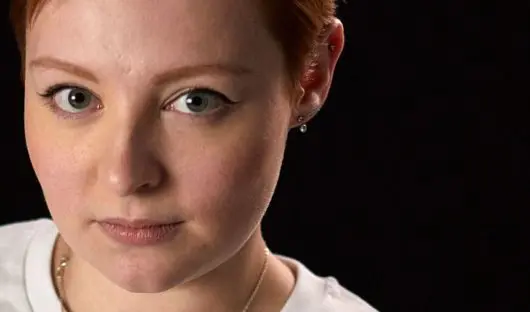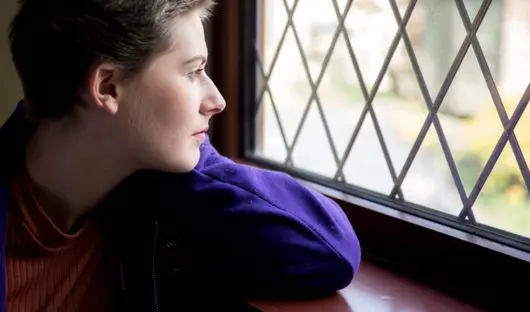How bad will treatment make me feel?
Everyone reacts differently to treatment, so it’s hard to say how you might feel. Some people might struggle with side effects, while others sail through. If you’re having problems, always ask the team looking after you for help. And try to remember that, although the side effects of cancer treatment can be tough, most of them are only short-term and will gradually disappear once your treatment is complete.
Losing your hair
Chemo drugs target and kill cancer cells. The drawback is that they are so super keen that they can’t tell the difference between cancer cells and other fast-growing ‘healthy’ cells. This is why it can make your hair fall out.
Your hair can form a big part of your identity. This means losing it and dealing with changes can be very hard, even traumatic. It’s absolutely normal to be more worried about losing your hair than the cancer itself – don’t feel bad if you can relate to this.
There is a ton of support and loads that you and your team can do. Make sure that whatever you choose to do makes you feel empowered and confident. Here are different things to try:
- Prepare for your hair to fall out, instead of waiting for it to happen. Some people like to shave their head before treatment starts so it’s on their terms. Or you could take a sample of your hair so you can match a wig to it, if you want to keep looking like you.
- Experiment with makeup options if you lose your eyebrows and lashes – staff at makeup counters can find products that work for you and show you how to use them. YouTube tutorials might also inspire your creativity!
- Take control and own a new look. Make a statement with bolder makeup and jewellery.
- Ask your nurse about services that can help you find wigs or choose hats and scarves. You can treat real hair wigs like you would your normal hair which means shampooing, blow-drying, curling and straightening are all good. Synthetic wigs are supposedly better for shorter styles.
- Ask your medical team if you qualify for a free NHS wig and how to get hold of one. If you’re in Wales or Northern Ireland, then wigs are free for all.
- Research salons that offer special programmes for people having cancer treatment to help you look and feel your best.
- Ask your hospital team about ‘scalp cooling’ to try and slow down hair loss when you’re having chemotherapy. It’s when you wear a cap filled with a refrigerated gel, or that’s connected to a refrigeration machine.
Feeling tired
Treatment can be intense and it’s common to feel really tired (or ‘fatigued’ if you want to get technical). The tiredness should ease up when your treatment is finished but you’ll have been through a lot physically and emotionally, so it’s quite normal to feel tired for a while afterwards. Try to focus on doing what makes you happy and energised, and remember to be kind to yourself. If you need to have a Netflix binge, do it. Here are some other tips:
- Use a diary to keep track of when you feel really tired and show it to your doctor or nurse who can suggest ways to help you get the rest you need.
- Pace yourself and get lots of rest.
- Think about things you can do with friends that aren’t too demanding, like a film and snacks night.
- Speak to your doctor to see if it’s safe to have a massage or aromatherapy to relax you.
- It might sound counter-intuitive but exercise can help to beat tiredness. A physiotherapist can put together an exercise programme that’s right for you.
- Have a nice bath and shower, either to energise you in the morning, or relax you before bed.
- Try going to bed at the same time every night and waking up at the same time in the morning. Make your bedroom a peaceful haven — avoiding using it as a place to work or study can help you relax.
Lack of concentration
Heard of ‘chemo brain’? It’s when you feel ‘foggy’ or find it hard to focus on anything for very long. It might mean that studying or work needs to take a backseat for a while which can feel frustrating. To deal with concentration problems, you can:
- Avoid overwhelming yourself by planning too far ahead — take each day as it comes.
- Keep yourself mentally stimulated with crosswords, sudoku or brain trainer apps.
- Use planners, calendars, post-it notes, to-do lists and reminders on your phone.
- Keep notes of anything important, such as conversations with your doctor – or ask someone to take notes for you.
- Chat with your family and friends about any difficulties you’re having with concentration and memory so they can help.
- Talk to your doctor as they might be able to do something.
Feeling sick
Chemo is renowned for making people feel nauseous. If you’re vomming a lot – talk to your specialist. They might be able to prescribe anti-sickness drugs to reduce this.
- Avoid eating or preparing food when you feel sick, especially foods with strong smells.
- Go for cold or slightly warm food if the smell of cooked or cooking food makes you feel sick.
- Rather than having three meals a day, try eating small meals and snacks – or just whenever you feel like it.
- Relax and try to take your mind off it – get lost in a film or audiobook, or try listening to a relaxation track.
- Ginger and peppermint can help. You could try ginger or peppermint tea, sucking on mints, ginger biscuits or ginger ale.
- Try not to drink loads before you eat.
- Sucking on ice has been known to help.
Skin problems
Cancer treatments can leave your skin more sensitive and sore than usual. If you are having external radiotherapy, you may develop a skin reaction, like sunburn. If this is going to happen, it usually begins about ten days after treatment. Let your specialist know if you notice any soreness, itchiness or colour changes, especially if you’re dealing with conditions like acne or eczema. Try to keep up a good skincare routine and look out for mild or gentle ranges of products such as cleansers, toners and moisturisers – they will still do the job.
Changes in appetite
Treatment does weird things to your taste buds. Some of your favourite food items might suddenly taste revolting. Or you might feel hungry at odd times. It’s important to try and maintain your weight and to drink plenty of fluids during your treatment, which can be hard if all you’re craving are delicious salty snacks or sweet treats. Ask if you can speak to the hospital dietitian. They’ll have some good ideas about how you can get the nutrition and calories you need, in a way that’s still satisfying and do-able on treatment.
Increased appetite and weight gain
Taking steroids may make you feel hungrier, and you might find it difficult to maintain your former weight. Your appetite will go back to normal once you stop taking the steroids, but some people need to watch their diet and exercise levels to lose the extra weight.
Diarrhoea or constipation
Oh, the joy. Chemo drugs may affect how your bowel works leading to constipation or diarrhoea. This can be helped by laxatives or anti-diarrhoea drugs. Don’t struggle on in silence. It might feel embarrassing to tell your team but to them, it’s really no big deal – it’s pretty much guaranteed there’s nothing they won’t have heard before!
Mouth ulcers and sores
A sore mouth can be seriously miserable on chemo. They should disappear after you finish treatment, but in the meantime, look after your oral health. Do this by cleaning your teeth regularly but gently and have frequent dental check-ups. It’s also important to keep hydrated so sip water throughout the day. Opt for soft foods and avoid acidic, spicy or crunchy items – and steer clear of cigarettes and alcohol. Your dentist, nurse or doctor might have some handy tips to soothe your sore mouth so make sure you ask.
Difficulty sleeping
Some people find that taking steroids leads to difficulty sleeping. Taking your tablets first thing in the morning may help. Often insomnia can be caused by stress and anxiety too, so make sure you have someone to talk to about any worries. If you’re suffering, Macmillan has some good advice about the causes of insomnia and what can help.
Changes in mood
You may find that you feel more anxious or emotional while you are taking steroids, and that you feel tired and low for a while after you stop taking them. Keep an eye on how you’re feeling. If you feel like you are struggling to cope or you’re constantly down, tell your consultant and get help. It may be the drugs, or you might need some extra support for everything you’re dealing with.
Fertility
Some chemotherapy drugs may temporarily or permanently affect your ability to have children. If your ovaries or testicles are within your radiotherapy treatment area, this also may affect your fertility. It is important to talk to your specialist about the options available to you before beginning treatment. You may be able to store eggs or sperm before your treatment begins, to use if you and a partner want to have children later.
Find out more about your fertility and treatmentYou might also want to read...
Body image and cancer treatment
Dealing with changes to your body can knock your confidence. Here's how to boost your self-esteem.
Read more
Contacts for your emotions and mental health
Useful organisations, resources, apps and communities for emotional and mental health support.
Read more
Life after cancer: Getting back to “normal” after treatment
Life doesn't just get back to normal after cancer treatment ends. Here's why it can hit hardest emotionally.
Read more